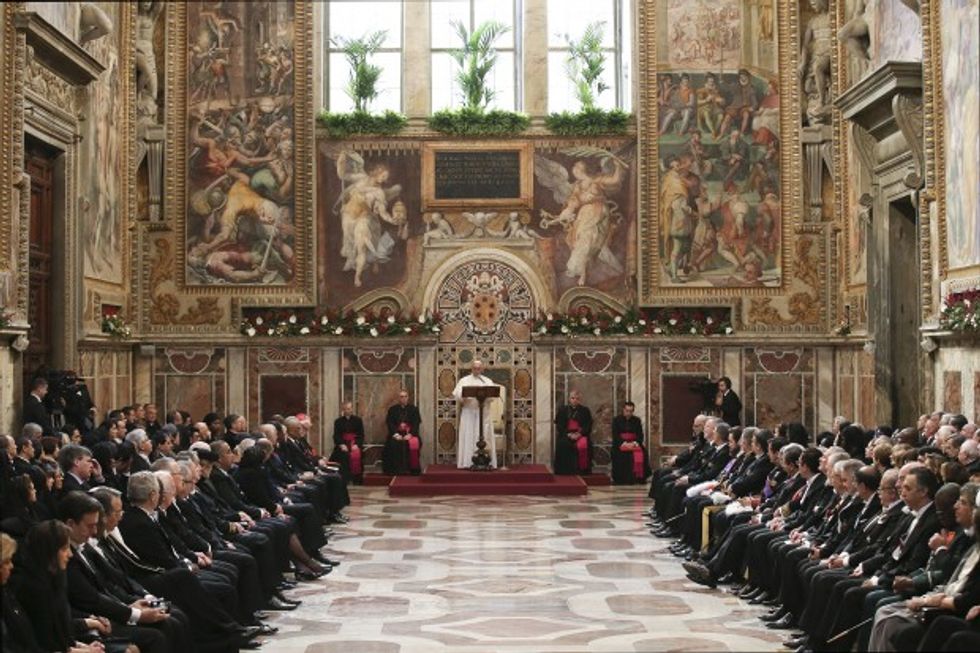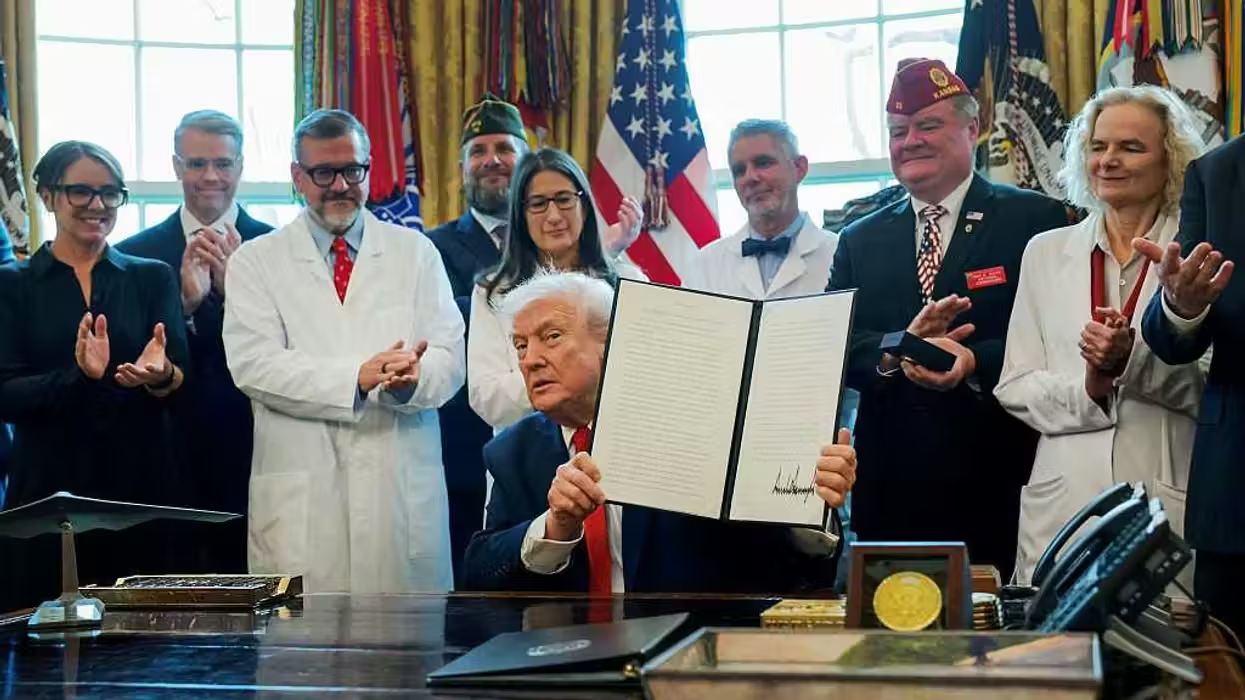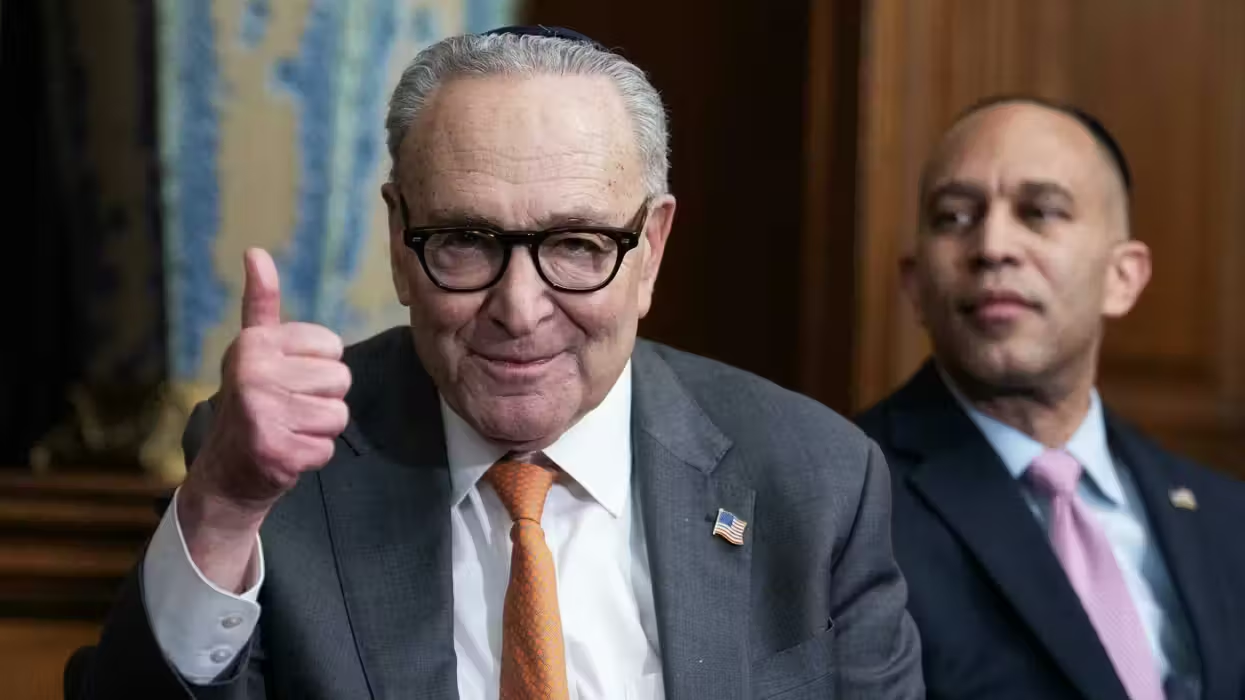
© 2025 Blaze Media LLC. All rights reserved.
Pope Francis to World Leaders: 'Every Authentic Practice of Religion Cannot Fail to Promote Peace
January 11, 2016
"Peaceful co-existence between the followers of different religions is possible when religious freedom is recognized."
Pope Francis addressed a distinguished group of global leaders Monday at the annual gathering of the Diplomatic Corps, held at the Sala Reggia in the Vatican.
In his address, the pope did not shy away from difficult international issues, such as the migration crisis, climate change and radical religious extremism. He acknowledged all of these topics as being pertinent and even crucial to this year’s theme of Jubilee, or mercy.
Pope Francis used the example of the legal ratification of Catholic Church in Chad and Palestine to illustrate “how peaceful co-existence between the followers of different religions is possible when religious freedom is recognized” and that there is “practical cooperation” in the “pursuit of the common good.”
The pope then asserted that “every authentic practice of religion cannot fail to promote peace.”

The question of peace as it relates to religion has been linked to hotly debated questions regarding the character of God and whether Christians, Muslims and Jews worship the same God.
“Only a distorted ideological form of religion can think that justice is done in the name of the Almighty by deliberately slaughtering defenseless persons, as in the brutal terrorist attacks which occurred in recent months in Africa, Europe and the Middle East,” the pope said.
He reaffirmed the Muslim community of the Central African Republic's statement that “'those who claim to believe in God must also be men and women of peace' and consequently of mercy, for one may never kill in the name of God.”
The pope proceeded to discuss the role of family in teaching and administering mercy. He called the family unit a “school of mercy, in which we learn to see God’s loving face and to mature and develop as human beings.” Fraternity and solidarity in the family, he claimed, are key in establishing a peaceful society where individuals feel “a sense of responsibility for others.”
Pope Francis used the current refugee crisis as an example of how family-like mercy and solidarity can be applied to help those seeking asylum in other countries. Scripture, he claimed, is full of stories about migrations in which individuals fled their native lands in search of freedom and peace.
“The Bible as a whole recounts the history of a humanity on the move,” the pope said, “for mobility is part of our human nature.”
He then denounced the “individualistic spirit” that pervades modern society, calling it a “fertile soil for the growth of that kind of indifference towards our neighbors which leads to viewing them in purely economic terms, to a lack of concern for their humanity, and ultimately to feelings of fear and cynicism.”
“Persons are no longer seen as a paramount value to be cared for and respected,” he said, “especially when poor or disabled, or ‘not yet useful’ — like the unborn — or ‘no longer needed’ — like the elderly.”
The pope claimed that “many of the causes of migration could have been addressed some time ago” but that this would require “rethinking entrenched habits and practices” concerning resource allocation, arms trade and “the grave scourge of corruption.”
He stressed the importance of “integrating migrants in their receiving countries,” while at the same time “promoting the development of their countries of origin through policies inspired by solidarity.”
The pope claimed it crucial that countries not overlook the cultural implications of integrating foreigners who share vastly different and often conflicting ideologies.
“Extremism and fundamentalism find fertile soil not only in the exploitation of religion for purposes of power, but also in the vacuum of ideals and the loss of identity — including religious identity — which dramatically marks the so-called West,” he said.
Pope Francis seemed to suggest that, far from promoting tolerance and peace, cultural and religious relativism in the West actually facilitates extremism.
“The greatest challenge we face,” he said, “is that of overcoming indifference and working together for peace, which remains a good which must constantly be sought.”
The pope then reflected on a few important international decisions of 2015, including the Iran nuclear deal and the Paris climate summit.
He called the two major meetings “a powerful collective realization of the grave responsibility incumbent on individuals and nations to protect creation.” But he clarified, such decisions are only helpful when they “prove more than simply a good intention” and actually succeed in “safeguard[ing] our beloved earth for the sake of all mankind, especially generations yet to come.”
The pope’s address on Monday came just one day before the release of his new book, “The Name of God Is Mercy,” in which he focuses on the human imperative to defend the marginalized, aid the oppressed and care for the world’s economic and natural resources.
Want to leave a tip?
We answer to you. Help keep our content free of advertisers and big tech censorship by leaving a tip today.
Want to join the conversation?
Already a subscriber?
more stories
Sign up for the Blaze newsletter
By signing up, you agree to our Privacy Policy and Terms of Use, and agree to receive content that may sometimes include advertisements. You may opt out at any time.
Related Content
© 2025 Blaze Media LLC. All rights reserved.
Get the stories that matter most delivered directly to your inbox.
By signing up, you agree to our Privacy Policy and Terms of Use, and agree to receive content that may sometimes include advertisements. You may opt out at any time.






